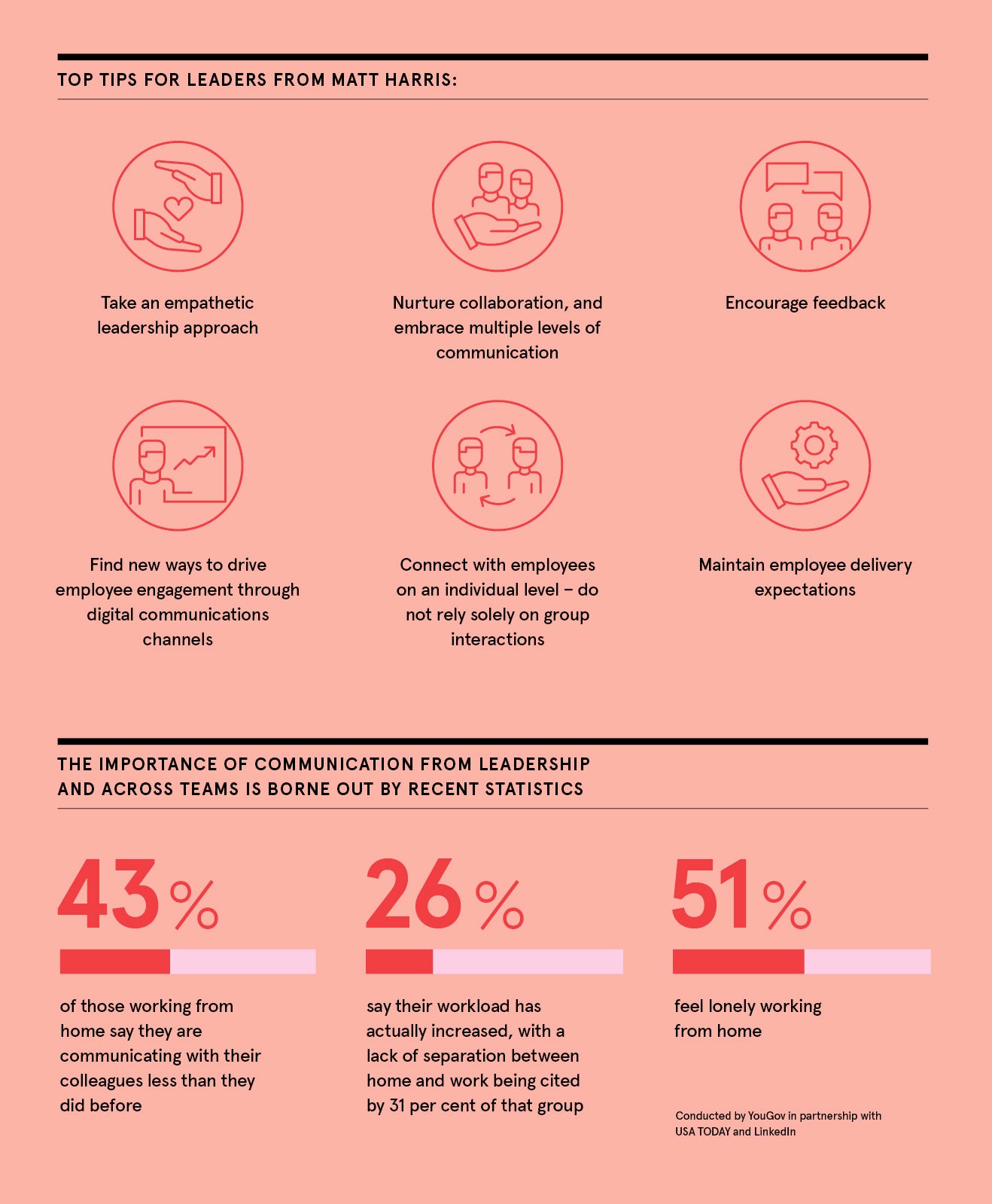In a crisis, it is imperative to get ahead of the questions that are going to be in the hearts and minds of your people. So says Matt Harris, group head of international operations at Argo Group.
“People are hearing scary numbers. The economic impact appears to be substantial, so there is a lot of uncertainty. As a leader, it is your job to translate what people are hearing into something tailored to your industry,” he says.
Harris’s assessment of the economic landscape chimes with a survey of 17,800 UK business leaders by the Office for National Statistics. Published on April 9, the survey found that 47 per cent of businesses across all industries had seen lower than normal turnover as a result of the coronavirus outbreak.
In addition, the survey notes that some 48.2 per cent of employees at these businesses were entirely working from home, with a further 47.7 per cent being encouraged to do so.
Empathetic leadership
Harris says the change in working behaviours in the current crisis has been dramatic for many and has underscored the need for leaders to take “an empathetic leadership approach” during the initial weeks.
“In the first couple of weeks, it was all about acknowledging the difficult circumstances, but making sure people had the infrastructure to get the job done,” he explains. “Once that was stabilised, and people knew they could function remotely, the leadership imperative has been to bring people back to their goals and objectives.”
The international operations boss says employees’ anxiety about ceasing to be office based may require leaders to nurture collaboration, to ensure the entire workforce remains engaged. This, he says, requires several techniques.
“There are multiple levels of communication which are equally important: daily calls with the executive team, separate calls with the business continuity group and making sure there is frequent one-to-one contact with employees,” says Harris.
As a leader, it is your job to translate what people are hearing into something tailored to your industry
Argo has embraced conference calls that are group-wide or team specific to express gratitude for employee efforts and reflect on how global events may specifically affect the industry further downstream. Typically, these calls cover customer retention successes, completed projects and offer the ability for employees to raise questions.
“You can never be clear about what’s on every single employee’s mind, so we do a question-and-answer process, through an anonymous link,” Harris explains.
“Our people simply post questions and we answer them. It is about acknowledging the difficult set of circumstances, but dealing with each question in a transparent manner,” he adds.
Encouraging feedback
Use of anonymous polling, which has been embraced by Argo during this crisis, was endorsed in a 2018 paper published in the Harvard Business Review, co-authored by renowned Wharton Business School professor Adam Grant and two senior executives at Facebook.
The paper concluded that surveying the workforce anonymously offers employees the chance to feel heard and can act as a vehicle for changing behaviour.
But Harris insists leaders must go beyond traditional methods of communication and find new ways to drive employee engagement through digital channels.
“I don’t think anything has fast-tracked the need to embrace a variety of digital communication mediums like the current situation,” he says. “Organisations have embarked upon a version of a digital strategy.
“We are doing WebEx calls, using Zoom, using Microsoft Teams. I get invitations to dial in and see 18 to 20 faces on the screen. That is not perfect, but people can physically see you. It drives camaraderie and I am increasingly impressed by how effective some of those platforms have been.”
Harris stresses the need for leaders to remain connected with employees on an individual level and not to rely solely on group interactions. He acknowledges that one-to-one interactions are impossible with every colleague on a weekly basis, but believes weekly written communications can go some way to bridge this gap.
At the same time, Argo’s leadership has sought to maintain employee delivery expectations, so colleagues know what is expected of them in the new working environment.
“We put a lot of emphasis on performance objectives,” Harris explains. “The challenge I put out to the leadership group early on is making sure everyone in the team is very clear about what is expected to be delivered.”
Maintaining contact
As an insurance business, Argo is people orientated, which means face-to-face contact with brokers is vital. Harris has urged colleagues to maintain that interaction. “We have implored leaders not to cancel meetings. You have to maintain the dialogue, but you may need to be creative around how you do that,” he says.
For business leaders, finding a way to maintain customer engagement is a priority in the current economic climate. Like other forward-thinking businesses, Argo has been considering how best to connect with clients.
Recent innovations include establishing a broker forum, a digital meeting place where top business producers can discuss the current market developments with their broker colleagues.
“There will be a conversation around COVID-19, the impact on the business and the impact on the industry,” says Harris. “We are going to open up the Q&A to our brokers so they can submit questions which are on their minds.”
While senior executives may be tempted to focus on the challenges of the current environment, it is also important to seize the opportunities that the new working arrangements have thrown up, he adds.
“I probably would not have had the frequency of dialogue with our senior business partners that I have had,” Harris concludes. “You are not losing hours in aeroplanes. You are not stuck in meetings. You have more time to connect. When you need to talk to someone, you can pretty much get them.”
For more information please visit www.argolimited.com
Empathetic leadership




